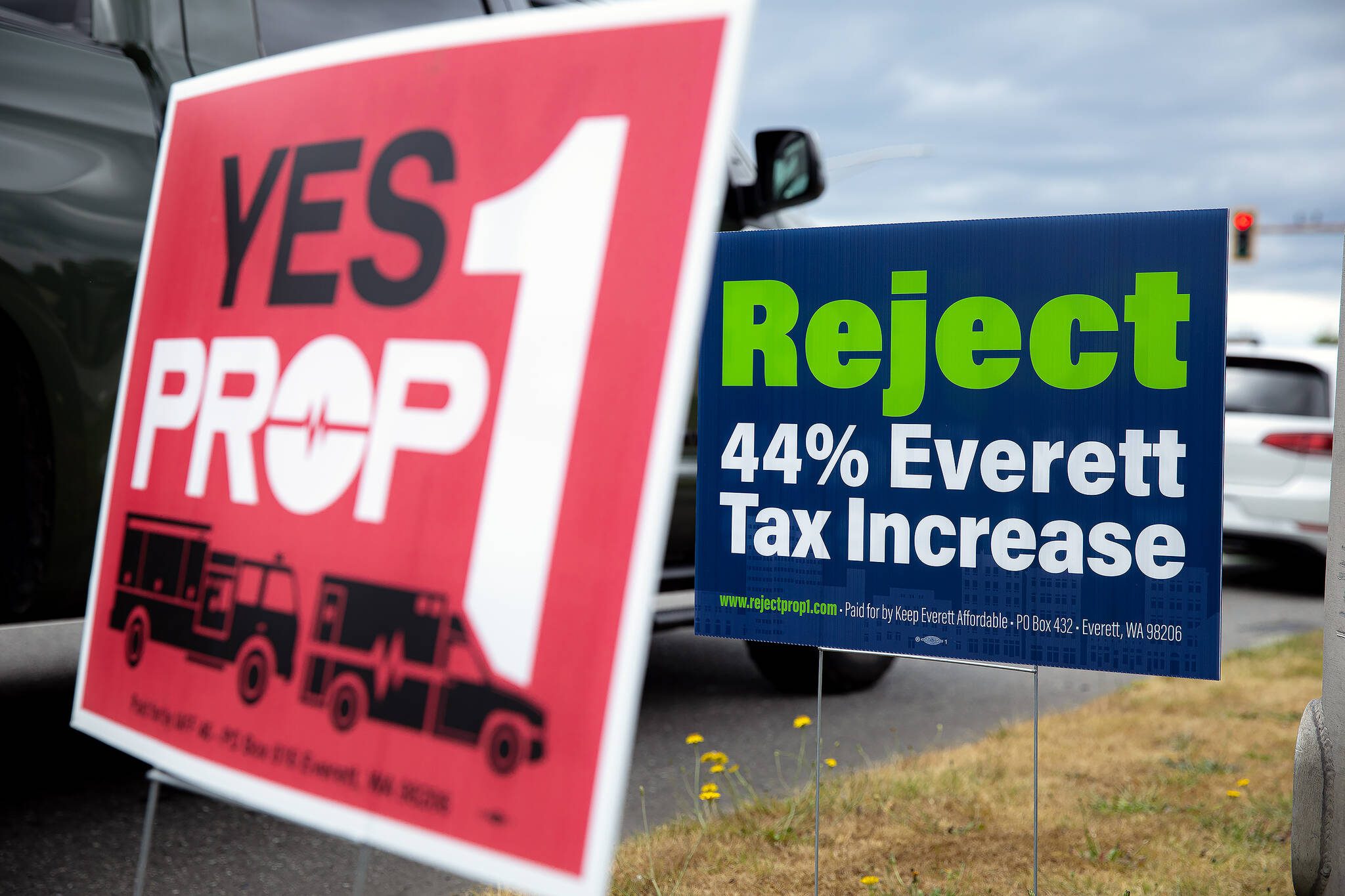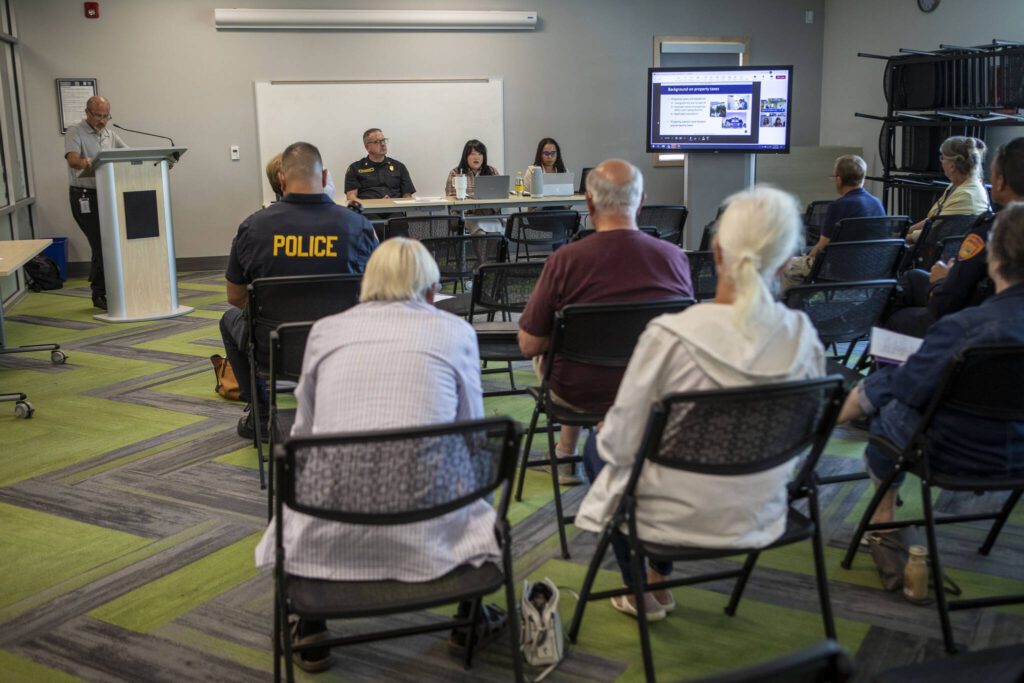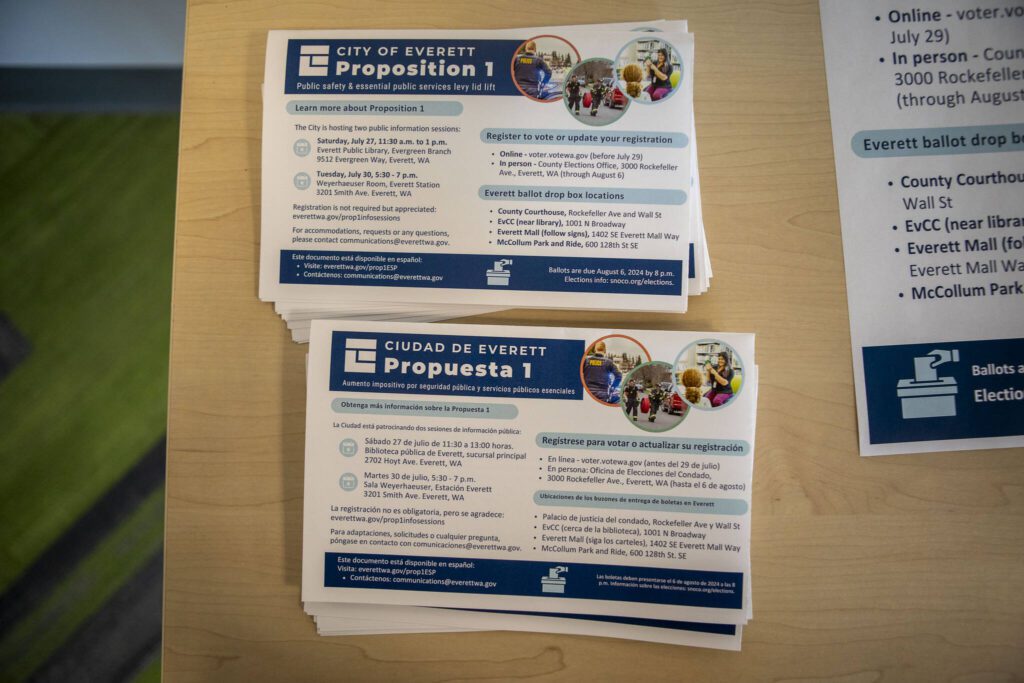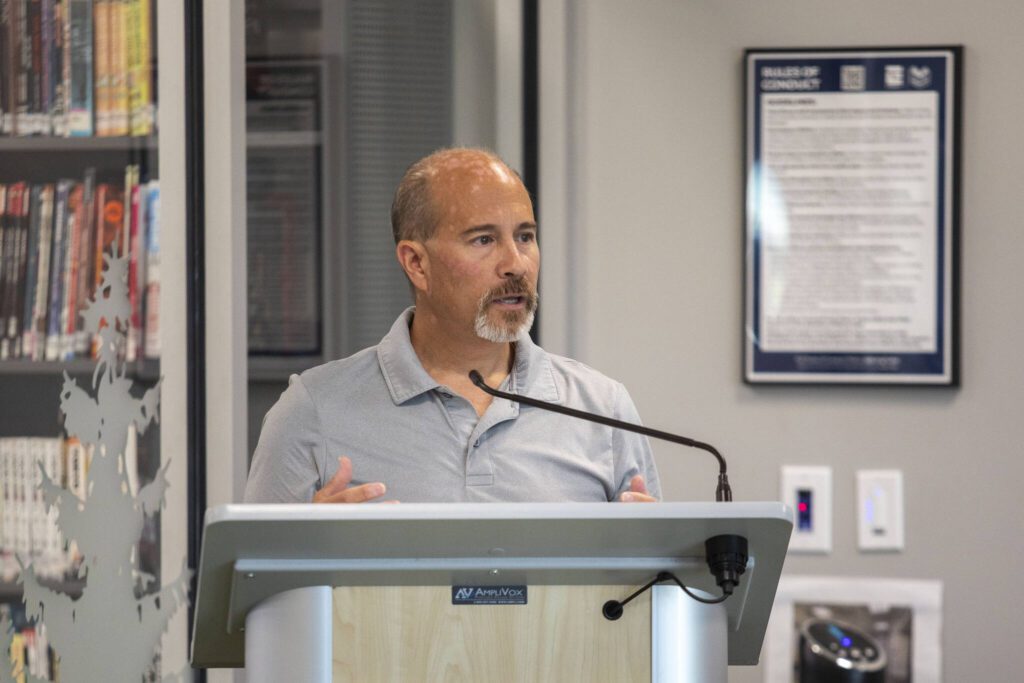EVERETT — After months of buildup, Everett voters will finally get a say next week on a proposed property tax hike — a potential temporary fix for the city’s budget deficit.
If it passes, the city’s rate will rise to $2.19 per $1,000 of assessed value, up from $1.52 — a 44% jump.
The percent increase applies only to taxes paid to the city of Everett, not taxpayers’ total bill. City staff say the bump in revenue would solve the deficit for three years.
The new tax rate would cost the average Everett homeowner an extra $28 per month, according to a city estimate.
Proponents of the measure say the lid lift will go toward essential services. Detractors say city spending is out of control and the additional tax will burden Everett residents.
Each side argues their position protects low-income residents.
Looming cuts
City staff forecast a $12.6 million deficit for 2025, a projection that grows to $35.4 million for 2030.
State law dictates levy increases must stop at 1% per year, unless voters approve a larger rise.
Finance Director Heide Brillantes said the city has already made significant cuts to address the deficit. For instance, she said, the city eliminated most recreation programs, including the Everett library’s bookmobile and the Forest Park Swim Center.
Property taxes make up 35% of the city’s tax revenue. Assistant Finance Director Jamielee Graves said property taxes are more stable than other revenue sources, like sales and business and occupation taxes that are more sensitive to economic conditions.
A $12.6 million deficit represents about 85 to 100 full-time positions, said city spokesperson Simone Tarver. City staff don’t intend to cut police or firefighter positions if the levy doesn’t pass, she said, but will have to slash funds for “quality of life” services like parks, libraries and social services.
In an interview, Mayor Cassie Franklin said these services are most desperately needed by residents with little means, who rely on city resources.
Franklin said asking for a lid lift took “political courage,” adding the city “did not have a council that was willing to ask a few years ago.”
“Other cities have already done this,” she said. “Everett hasn’t done it in 23 years. And we should have.”
Rival committees, rival candidates
At a City Council meeting in April, Franklin called the lid lift “a major step forward in us really having security in those essential services.”
Meanwhile, a mayoral hopeful has vehemently criticized the measure. Former City Council member Scott Murphy, who will challenge Franklin in 2025, says Everett has a spending problem.
Murphy chaired the city’s budget committee from 2017 to 2021.
The debate has spawned rival political action committees. Keep Everett Affordable has raised $27,500 to fight against the lid lift. It counts a handful of Everett real estate companies, but not Murphy, among its backers.
The group’s treasurer, Michael Swanson, served the same role in Franklin’s last mayoral campaign. Swanson said he parted ways with the mayor this year because he was unhappy with her leadership, particularly with what he saw as a lack of planning for the city’s new AquaSox stadium.
On the other side, Lift Up Everett is campaigning for the ballot measure. Its contributors, several of them city staffers, have raised about $7,000.
All City Council members but Judy Tuohy have endorsed Lift Up Everett, as have the city police and firefighter unions. The state union for county and city employees has also endorsed the committee.
Franklin vs. Murphy
Franklin called Murphy’s vocal opposition to the lid lift “a political attack” related to his run for mayor.
Providing city services “should be our number one goal” as elected officials, she said. “It’s sad to see people willing to risk that that are running for office.”
Murphy said it was “very disappointing” Franklin would suggest his pushback is politically motivated.
“One of the reasons I am running for mayor is I believe the city’s finances are a mess,” he said. “And it’s in particular become quite clear with this 44% property tax increase that things are even worse than I had originally thought.”
Tarver said the proposal would have less of a disproportionate impact on low-income households than other taxes. Sales taxes, meanwhile, are imposed on necessities, she noted.
Swanson contended the levy lift is regressive, as it would increase the cost of housing either directly through property taxes or indirectly through higher rents.
“I’m not really worried about the wealthy,” he said. “But what I am worried about are those living paycheck to paycheck that can’t afford to see their rent or mortgage go up more than it already has.”
Detractors argue overspending
Swanson and Murphy called attention to increased spending since 2021.
This year’s Human Resources budget, for example, has risen 46% from 2021, from about $1.7 million to about $2.5 million. The communication department’s budget rose 138% in that time, from $405,458 to $965,502.
In their view, the city is misleading the public about what might get cut to scare voters into voting for the levy.
Swanson said the city has not made commitments about what services it would bring back with the new revenue.
“The mayor’s not willing to cut anything,” Swanson said. “If you take that kind of approach, then you severely limit the different avenues you can take to correct the situation.”
A rejection from voters will force the city to “put everything on the table again” and think about cuts, he said.
Murphy said he was concerned the city had not sufficiently looked into what automation was available to increase its efficiency.
“You can’t run the city now in 2024 like you did in 2014 or 2004,” he said. “There’s technology and improvements that need to be implemented. And if the city hasn’t done that, that’s really a missed opportunity.”
The city responds
The city has fewer staff per 1,000 residents than 10 years ago, down to 6.5 from 7.1 in 2014, Tarver wrote in an email.
The rise in communications spending can be attributed to staff moving over from other departments, she wrote, and to the department’s role expanding.
“There isn’t a department in the city that’s not doing more work with less people,” she said in an interview.
If the levy doesn’t pass, “every single department that our residents experience will be impacted,” Franklin said, noting specifics about exact cuts are “not a decision that I alone could or would make.”
Tarver said city staff have already used technology to improve processes, adding “these solutions still require staff and can’t fully take the place of a person.” The police department’s new camera system to surveil parks and streets is one example, she wrote.
She wrote the city has committed to more social workers at the police department, more open hours for the library and looking into a private partnership to open the swim center at Forest Park again.
Franklin called it “disingenuous” of the opposition “to say that the city needs to just find additional cuts.”
Murphy is “very aware of a lot of cuts that we’ve made and how deep they went,” she said. “It’s very easy to just make statements like that, but bring forward no solutions.”
Ballots are due Aug. 6.
Sophia Gates: 425-339-3035; sophia.gates@heraldnet.com; Twitter: @SophiaSGates.
Talk to us
> Give us your news tips.
> Send us a letter to the editor.
> More Herald contact information.





























